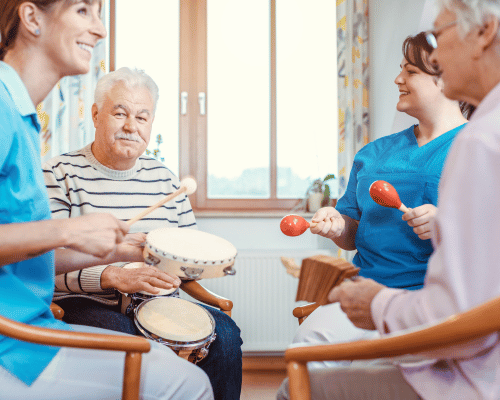Music can touch our souls, evoke emotions, and bring back cherished memories. It has long been recognized as a powerful therapeutic tool capable of improving the overall well-being of individuals. Regarding senior care, caregivers have discovered the remarkable benefits of incorporating music therapy into their daily routines. In this article, we will explore the profound impact of music therapy on senior care and delve into the various ways caregivers can integrate this therapeutic approach into their practices. From enhancing cognitive function to reducing anxiety, music therapy has the potential to improve the quality of life for seniors in countless ways.
Music therapy has emerged as a powerful tool in enhancing seniors' well-being and quality of life. Music as a therapeutic intervention in senior care has shown remarkable benefits across physical, emotional, cognitive, and social domains. From promoting emotional well-being and reducing anxiety to stimulating cognitive function and memory recall, music therapy offers a holistic approach to senior care.
Music can evoke strong emotional responses. For seniors, who may experience feelings of loneliness, depression, or anxiety, music can provide solace and comfort. By incorporating music therapy into senior care, caregivers can create a soothing and supportive environment, helping seniors feel more relaxed and content. Research has shown that music can reduce anxiety levels, calm agitation, and even alleviate symptoms of depression.
One of the remarkable benefits of music therapy for seniors is its positive impact on cognitive function and memory recall. Music uniquely engages multiple areas of the brain, stimulating neural connections and promoting mental agility. Caregivers can use music therapy techniques to enhance cognitive abilities, such as attention, memory, and problem-solving skills. Additionally, music can evoke memories associated with specific songs, enabling seniors to reminisce and reconnect with their past.

Incorporating music therapy into physical rehabilitation programs can benefit seniors recovering from injuries or illnesses. Rhythmic music can motivate seniors during exercise sessions, helping them improve their range of motion, strength, and coordination. Furthermore, music therapy can assist in gait training and balance exercises, reducing the risk of falls and enhancing overall mobility.
Fostering Social Interaction and Connection
Seniors often experience feelings of isolation and loneliness, especially when separated from their loved ones or residing in care facilities. Music therapy can serve as a bridge, fostering social interaction and connection among seniors. Group music therapy sessions allow individuals to come together, engage in meaningful musical activities, and form bonds with fellow participants. Music therapy helps combat loneliness and promotes emotional well-being by creating a sense of community.
Chronic pain is a common issue among seniors and can significantly impact their quality of life. Music therapy offers a non-pharmacological approach to pain management, providing relief and promoting relaxation. Calming music and relaxation techniques can help seniors reduce stress, alleviate physical discomfort, and enhance their overall sense of well-being.
When integrating music therapy into senior care, caregivers play a crucial role in implementing practical strategies that harness the power of music. By incorporating music into daily routines, creating personalized playlists, organizing music therapy sessions, and actively engaging seniors in singing and musical activities, caregivers can maximize the therapeutic benefits for seniors.
These strategies promote emotional well-being and cognitive stimulation and enhance social interaction, physical rehabilitation, and relaxation. Caregivers serve as catalysts in utilizing music therapy as a transformative tool in senior care, creating a nurturing and enriching environment for seniors to thrive.

One effective way for caregivers to incorporate music therapy into senior care is by creating personalized music playlists. By identifying music preferences and selecting songs that resonate with seniors, caregivers can create playlists that evoke positive emotions and memories. These playlists can be played during various activities, such as mealtime, exercise sessions, or relaxation periods, enhancing the overall experience for seniors.
Caregivers can actively engage seniors in singing and participating in musical activities. Singing familiar songs or learning new ones can bring joy and create a sense of accomplishment. Additionally, caregivers can provide simple musical instruments, such as shakers or tambourines, for seniors to use during music sessions. These interactive activities promote social engagement, cognitive stimulation, and sensory integration.
Collaborating with professional music therapists can significantly enhance the benefits of music therapy for seniors. Caregivers can organize regular music therapy sessions, individually or in groups, where seniors can actively participate in guided musical experiences. Music therapists are trained to tailor activities to meet seniors' specific needs and abilities, ensuring a holistic and enriching therapeutic experience.
Integrating music into daily routines can have a transformative effect on senior care. Caregivers can play calming music during baths or relaxation, creating a serene and peaceful atmosphere. Upbeat and energetic music can be utilized during exercise sessions to motivate seniors and increase their enjoyment of physical activities. By seamlessly incorporating music into daily routines, caregivers can maximize the therapeutic benefits for seniors.

Looking into caregiving services may be overwhelming, but with BrightStar Care South Orange County we ensure to make the process so much easier for you. We are confident that our team of professionals will assist you in looking for the right caregiver to take care of your loved one by keeping you in the loop and more. Contact us today to learn more about caregiving services! Our office proudly serves the South Orange County area. Our office is located at BrightStar Care of South Orange County 26023 Acero, Mission Viejo, CA 92691, United States. You may also call us at
The Benefits of Music Therapy for Senior Care
Music therapy has emerged as a powerful tool in enhancing seniors' well-being and quality of life. Music as a therapeutic intervention in senior care has shown remarkable benefits across physical, emotional, cognitive, and social domains. From promoting emotional well-being and reducing anxiety to stimulating cognitive function and memory recall, music therapy offers a holistic approach to senior care.
Promoting Emotional Well-being and Reducing Anxiety
Music can evoke strong emotional responses. For seniors, who may experience feelings of loneliness, depression, or anxiety, music can provide solace and comfort. By incorporating music therapy into senior care, caregivers can create a soothing and supportive environment, helping seniors feel more relaxed and content. Research has shown that music can reduce anxiety levels, calm agitation, and even alleviate symptoms of depression.
Stimulating Cognitive Function and Memory Recall
One of the remarkable benefits of music therapy for seniors is its positive impact on cognitive function and memory recall. Music uniquely engages multiple areas of the brain, stimulating neural connections and promoting mental agility. Caregivers can use music therapy techniques to enhance cognitive abilities, such as attention, memory, and problem-solving skills. Additionally, music can evoke memories associated with specific songs, enabling seniors to reminisce and reconnect with their past.
Enhancing Physical Rehabilitation and Motor Skills
Incorporating music therapy into physical rehabilitation programs can benefit seniors recovering from injuries or illnesses. Rhythmic music can motivate seniors during exercise sessions, helping them improve their range of motion, strength, and coordination. Furthermore, music therapy can assist in gait training and balance exercises, reducing the risk of falls and enhancing overall mobility.Fostering Social Interaction and Connection
Seniors often experience feelings of isolation and loneliness, especially when separated from their loved ones or residing in care facilities. Music therapy can serve as a bridge, fostering social interaction and connection among seniors. Group music therapy sessions allow individuals to come together, engage in meaningful musical activities, and form bonds with fellow participants. Music therapy helps combat loneliness and promotes emotional well-being by creating a sense of community.
Managing Pain and Promoting Relaxation
Chronic pain is a common issue among seniors and can significantly impact their quality of life. Music therapy offers a non-pharmacological approach to pain management, providing relief and promoting relaxation. Calming music and relaxation techniques can help seniors reduce stress, alleviate physical discomfort, and enhance their overall sense of well-being.
Practical Strategies Caregivers Incorporate into Music Therapy for Senior Care
When integrating music therapy into senior care, caregivers play a crucial role in implementing practical strategies that harness the power of music. By incorporating music into daily routines, creating personalized playlists, organizing music therapy sessions, and actively engaging seniors in singing and musical activities, caregivers can maximize the therapeutic benefits for seniors. These strategies promote emotional well-being and cognitive stimulation and enhance social interaction, physical rehabilitation, and relaxation. Caregivers serve as catalysts in utilizing music therapy as a transformative tool in senior care, creating a nurturing and enriching environment for seniors to thrive.

Creating Personalized Music Playlists
One effective way for caregivers to incorporate music therapy into senior care is by creating personalized music playlists. By identifying music preferences and selecting songs that resonate with seniors, caregivers can create playlists that evoke positive emotions and memories. These playlists can be played during various activities, such as mealtime, exercise sessions, or relaxation periods, enhancing the overall experience for seniors.
Singing and Participating in Musical Activities
Caregivers can actively engage seniors in singing and participating in musical activities. Singing familiar songs or learning new ones can bring joy and create a sense of accomplishment. Additionally, caregivers can provide simple musical instruments, such as shakers or tambourines, for seniors to use during music sessions. These interactive activities promote social engagement, cognitive stimulation, and sensory integration.
Organizing Music Therapy Sessions
Collaborating with professional music therapists can significantly enhance the benefits of music therapy for seniors. Caregivers can organize regular music therapy sessions, individually or in groups, where seniors can actively participate in guided musical experiences. Music therapists are trained to tailor activities to meet seniors' specific needs and abilities, ensuring a holistic and enriching therapeutic experience.
Incorporating Music into Daily Routines
Integrating music into daily routines can have a transformative effect on senior care. Caregivers can play calming music during baths or relaxation, creating a serene and peaceful atmosphere. Upbeat and energetic music can be utilized during exercise sessions to motivate seniors and increase their enjoyment of physical activities. By seamlessly incorporating music into daily routines, caregivers can maximize the therapeutic benefits for seniors.
